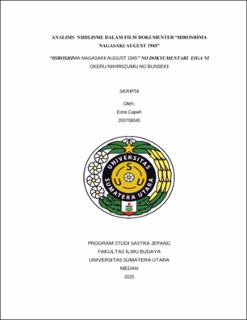Analisis Nihilisme dalam Film Dokumenter “Hiroshima Nagasaki August 1945”
Analysis of Nihilism in the Documentary “Film Hroshima Nagasaki August 1945”

Date
2025Author
Capah, Ezra
Advisor(s)
Muliadi, Yuddi Adrian
Alimansyar
Metadata
Show full item recordAbstract
This study examines the analysis of nihilism in the documentary film Hiroshima
Nagasaki August 1945 with the aim of understanding how the concept of nihilism is
presented and identifying the factors that contribute to the emergence of nihilism in
the film. Nihilism, as a philosophical view that denies meaning or purpose in life, is
analyzed through two main concepts: moral nihilism and existential nihilism. This
research uses a qualitative method with a descriptive-analytical approach to analyze
the narrative, visuals, and messages in the documentary. Data sources were obtained
through an in-depth examination of the film, supported by relevant literature on
nihilism and the impact of the atomic bombings in Hiroshima and Nagasaki. Data
collection was conducted using observation techniques to identify the depiction of
nihilism in the film. The research results showed that there are two concepts of
nihilism present in this documentary film, namely: Moral nihilism is the view that
ethical and moral values have no absolute foundation. In this film, it is reflected in the
destruction of humanity caused by the atomic bomb. Existential nihilism is the belief
that life has no meaning or purpose, as seen in the suffering of victims who lost hope
and direction in life after the tragedy.The main causes of nihilism in this documentary
are traumatic experiences due to massive destruction and the loss of life’s meaning
due to suffering.
Collections
- Undergraduate Theses [593]
